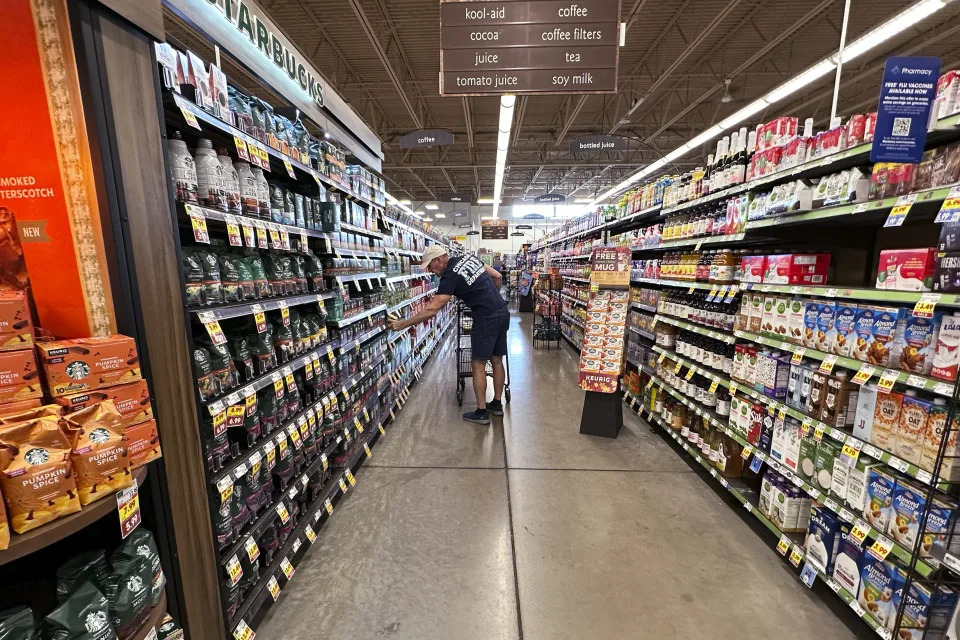News
Commentary: One of the biggest election factors is also one of the most misunderstood — inflation
Inflation played a big role in the outcome of this year's presidential election, but who to blame for it may have not been on the ballot.
About half of Trump voters cited high prices as the biggest issue affecting their vote, according to AP VoteCast , which surveyed over 115,000 voters nationwide. Almost 1 in 4 voters said inflation caused a severe hardship, according to exit polling data from Edison Research , with nearly three-quarters of them voting for Trump.
"Inflation is something that people deeply dislike, and that leaves lasting scars," Stefanie Stantcheva, a professor of political economy at Harvard University who recently did a study examining how people perceive inflation , wrote to Yahoo Finance. “And our findings suggest that many people blame the government for it.”

But the government may not be the right culprit. Who or what deserves the blame is harder to parse out. Even among economists, inflation, especially the source of its recent surge, is still hotly debated.
"Inflation is a really, really hard-to-understand phenomenon," Stantcheva said, "and economists disagree about its causes and consequences."
Read more: What is inflation, and how does it affect you?
Inflation’s recent path
What's not up for debate is that consumer prices surged following the pandemic. The spike was also a global phenomenon.
In the US, the inflation rate hit its highest point in this recent surge in June 2022 at 9.1% before interest rate hikes that the Fed implemented three months earlier started to curb the surge. Across the world in G7 countries, those recent peaks occurred later, but a similar trajectory emerged .
Survey after survey found that Americans were ticked off about the rise in prices. While part of that may have stemmed from its sudden unfamiliarity after living in a low, low inflation environment for a decade, their loathing is also deep-seated .
Folks largely feel the same way about inflation as they did in 1996, according to two academic surveys conducted then and now. Their gripes remain similar too: A big majority believe inflation erodes their purchasing power, which is correct, and that inflation means the economy is poor, when in fact the economy is growing very fast.
Stantcheva, who conducted the second survey of consumers on their feelings toward inflation, found in another recent study that people, especially Republicans, largely blame the government for inflation. That would track with the recent election outcome that rejected Biden’s vice president.
Still, the president has limited power when it comes to combating inflation, said William Luther, the director of the sound money project at the American Institute for Economic Research, a libertarian think tank, with the Federal Reserve holding more of the cards. Congress, too, is instrumental in any government spending.
"I'm inclined to think that we give both too much credit and too much blame to the president," said Luther, who is also an associate professor of economics at Florida Atlantic University.

A 'unanimous conclusion'?
So who's to blame for the inflation surge? Take your pick, according to a bevy of recent studies that don't provide much more clarity.
One paper published last year found that in 2021 and 2022, companies couldn't produce enough, creating a rush on goods and, in turn, prompting sellers to "jack up the prices until the market clears," said Diego Comin, a professor of economics at Dartmouth College and a co-researcher on the paper.
Fed policy also played a big role by making borrowing rates so low and so attractive. That's why housing prices and prices for used cars especially increased so much: It was cheap to get a mortgage and car loan. Add to that the wealth effect from a booming stock market, and demand skyrocketed.
Read more: Jobs, inflation, and the Fed: How they're all related
Stimulus spending? "Smaller potatoes," Comin said.
Not so, according to another study that concluded government stimulus created such a tight job market with higher wages that it "supercharged supply shocks," said Pierpaolo Benigno, a professor of monetary economics at the University of Bern.
A separate study released in May adds to this by finding the “Great Resignation” job switching created around 0.6 percentage points of additional inflation.
Yet another working paper released last month came to the "unanimous conclusion" that neither government spending nor Federal Reserve monetary moves caused inflation during the pandemic.
"The finding is not surprising to us, but might be surprising to some people," Cynthia Wu, a co-researcher on the paper and a research associate at the National Bureau of Economic Research, wrote to me. "Much of the debate (mostly with the opposite view from our findings) comes from the media."
When asked what was behind the COVID runup in inflation, Wu said simply: "That's beyond the scope of our paper."
'Not your garden-variety inflation surge'
Does that clear everything up? Probably not.
What makes it tough to disentangle the factors is how unevenly everything unfolded. There were supply shocks and then huge pent-up demand that was unleashed. There were lingering supply problems and more money injected into the system. There were labor shortages and then a robust job market to boot.
"This means it's not your garden-variety inflation surge, due only to a surge in excess aggregate demand (as some commentators reduce it to)," Iván Werning, a professor of economics at MIT and a researcher on several inflation studies , wrote to me.
Shooting the messenger
There was also a messaging problem. Fed policymakers and the Biden administration called the inflation “transitory.” But what did that mean? At first, the Fed implied that it did not need to act to bring down prices because high inflation wouldn’t stick around, Luther said. But that ended up not being the case.
"Was the inflation transitory? Yes, it didn't last forever," said Luther, who wrote about the definition of transitory in 2021 . "Was it transitory in the way that folks using that word seem to imply? No, I don't think so."
"The level of prices certainly did not come back down. They remained permanently elevated."
And that's what Americans took with them into the voting booth this week. All the studies in the world on inflation probably wouldn't have changed that.
@JannaHerron .

